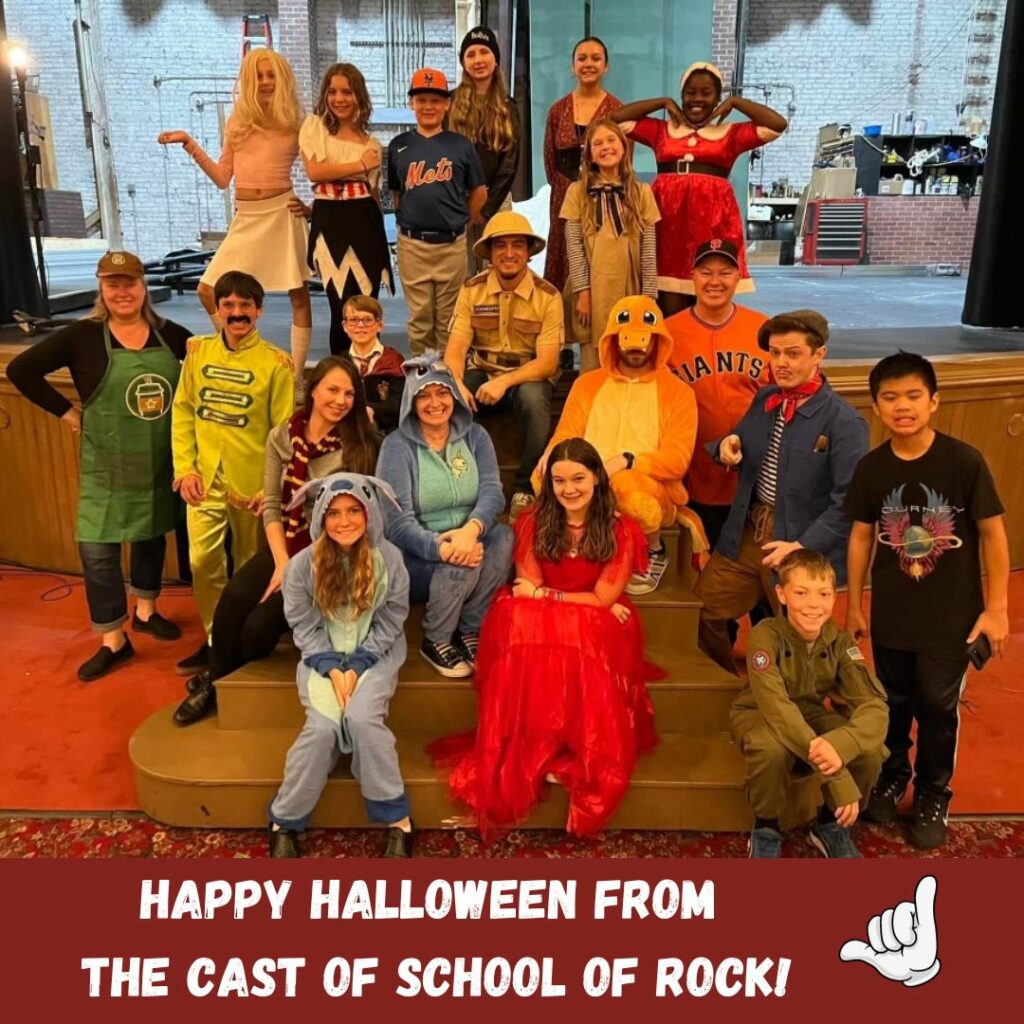
Nurturing Young Talent: Tips for Working with Child and Teen Performers

Promotional image by Kelly Jordan at KLJ Studios, for School of Rock at Woodland Opera House, Opening November 17th.
The magic of theater can often start at a young age, but working with young performers comes with its own set of unique challenges and important lessons. It’s a delicate balance of guidance, encouragement, and ensuring a positive experience for these soon-to-be stars.
I recently joined a production of School of Rock with Woodland Opera House and have been impressed with how well they work with young performers.
I sat down with our Director, Andrea St. Clair, to talk about her approach and share some learnings with anyone that wants to produce a show featuring kids and teens.
Introductions
Thanks for taking the time to talk with me. Can you tell everyone a bit about yourself and your experience working with young performers?

Education Director, Woodland Opera House
Sure thing! I’m a member of Actors’ Equity Association and an actor that found their way on the “other side of the table,” when taking on choreography gigs, teaching dance, leading acting workshops/classes, and even spending time in the public school system as a substitute teacher in between Equity contracts.
Over the last decade, working with children in the arts has become a highlight of my career, especially since stepping into the role of full-time Education Director here at the Woodland Opera House.
What’s your favorite thing about working with kids and teens?
Honestly, I love being able to inspire the next generation of performers and be the teacher I always needed as a kid.
The Basics of Working with Young Performers
Awww, that’s so wonderful! You have a real passion for teaching.
Now, before others try to follow in your footsteps, what’s the most important thing a director should be prepared for when working on a show with a lot of kids?
You absolutely have to know the show inside and out to determine your casting needs first and foremost. Each show has its own unique needs and challenges and by determining those, you’ll be able to have a more successful audition and casting process.
Working with children, whether in an educational setting or a full age-appropriate cast, you have to be able to set expectations for your youth cast – and their parents – for what the rehearsal process will be, your expectations on behavior and theatre etiquette, and to encourage regular at-home practice.
While adults will rise to the occasion, even your most experienced child actor at this level will need guidance through the process in order to produce their best work. You are not only directing them in a show, but you are also helping them build crucial skills for both the theatre and life.

I love how you mention theatre can help kids build skills for their life and the real world offstage. It must be so fulfilling to see children learn and grow during a show.
Outside of what you’ve already mentioned, what have you found most fulfilling about working on a show like School of Rock?
Kids are such a joy to work with! I absolutely love watching their performances grow more nuanced through a rehearsal process and watching the excitement they outwardly express when they know they’ve nailed something – its unparalleled!
When they succeed, I feel like I have succeeded as well. Plus, there is something about what you learn about yourself working with children; honestly, I grow increasingly inspired by some of the smallest things they do or say.
I am not certain the kids I work with understand their impact on me, but it’s a constant reminder of why I am where I am and why I do what I do. I wouldn’t trade this job for the world.
Accommodating Young Performers
So, we’ve talked before about how working with kids comes with its own challenges. As a director, what did you change about your directing style to accommodate young performers?
You have to have a lot more patience and grace with young performers than with adults, even if it’s just for the mere fact that they are younger and have less life experience.
Also, after setting expectations, I try to reach them on a level that will provide them with the most success. We’ve created mantras to support group morale (“Breadsticks!” was a recent one – long story behind that!), and I push for all to practice “humility and grace.” “Humility” so that they grow up to be people others want to work with and emulate with two feet firmly planted on the ground and “grace” so they practice having it with oneself; this is not only there to encourage a growth mindset, but to allow mistakes to happen so they may learn from them.
“You have to have a lot more patience and grace with young performers.“

Even the best actors make mistakes! So by having this fun but strict balance as both a teacher and a director, I found a lot of success in helping young actors grow to be the best version of themselves.
After all, I tell them that outside of their parents/grandparents, I’m their next biggest fan!
Tips and Tricks
Reminding performers, especially young ones, that it’s okay to make mistakes and giving them that space is so important.
Speaking more on accommodations for rehearsing, theatre can be demanding on schedules for kids and parents. Any tips or tricks on working with busy schedules during a school year?
It really comes down to creating an organized schedule and sticking to it. I grew up as a tremendously busy kid – my elementary and middle school years dominated by 15-20 hours of dance a week along with soccer, cheer, and voice/instrument lessons were a lot.
However, during that time I had excellent grades because my parents kept me on a firm schedule. By high school, theatre was a dominant force in my life, and along with cheer, school clubs, voice lessons, and auxiliary work, so once again I needed a schedule to be successful. Sure, I had challenges here and there – I was a normal teenager pushing boundaries – but it taught me a lot of important life lessons that I still use to this day.
Parents do need to understand that if a child is showing a particular inclination for the arts, oftentimes sacrifices in other areas must be made. Usually around the middle school ages, we often see families making the decision to go with sports or the arts.
It’s unfortunate that they often have schedules that conflict, but when families do decide to go “all in,” in one direction or the other, things tend to fall in place more easily. Plus, with the Opera House, we really do our best to work with internal conflicts with our dance and theatre classes when rehearsals come up for our shows.
Parents also need to realize that saying, “no” to something is okay. We offer a lot here at the Opera House, and it’s easy to want to do everything. Taking a break to do other things or have time to be a normal kid should be respected as well. It’s all about a balance.

Last but not least, any tips or tricks on how to keep focus during rehearsals?
Come well prepared, rested, fed, and hydrated! If you lack any one of these things, it will be easy to zone out or let hunger or dehydration zap your energy. Actors must take care of both their bodies and minds!
This is also where a personal mantra or creating a signal/mantra with a cast mate or group of cast members helps. It’s a subtle way to bring your focus back into the process. Acting is about being one hundred percent “in the moment” so it’s important to take the proper steps to ensure that in each rehearsal or performance.
Well, this has been really great! Thank you for taking the time to chat with me. I can’t wait to see the show come together next week. The kids have already sounded awesome in rehearsal.
To learn more about Woodland Opera House, you can check out their page here: Woodland Opera House
